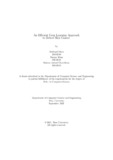| dc.contributor.advisor | Alam, Md. Ashraful | |
| dc.contributor.advisor | Reza, Md. Tanzim | |
| dc.contributor.author | Islam, Ashfaqul | |
| dc.contributor.author | Khan, Daiyan | |
| dc.contributor.author | Chowdhury, Rakeen Ashraf | |
| dc.date.accessioned | 2022-01-17T04:20:34Z | |
| dc.date.available | 2022-01-17T04:20:34Z | |
| dc.date.copyright | 2021 | |
| dc.date.issued | 2021-09 | |
| dc.identifier.other | ID 20341030 | |
| dc.identifier.other | ID 19141024 | |
| dc.identifier.other | ID 16141014 | |
| dc.identifier.uri | http://hdl.handle.net/10361/15932 | |
| dc.description | This thesis is submitted in partial fulfillment of the requirements for the degree of Bachelor of Science in Computer Science and Engineering, 2021. | en_US |
| dc.description | Cataloged from PDF version of thesis. | |
| dc.description | Includes bibliographical references (pages 52-53). | |
| dc.description.abstract | Each year, millions of people around the world are affected by cancer. Research
shows that the early and accurate diagnosis of cancerous growths can have a major
effect on improving mortality rates from cancer. As human diagnosis is prone to
error, a deep-learning based computerized diagnostic system should be considered.
In our research, we tackled the issues caused by difficulties in diagnosing skin cancer
and distinguishing between different types of skin growths, especially without the
use of advanced medical equipment and a high level of medical expertise of the
diagnosticians. To do so, we have implemented a system that will use a deep-learning
approach to be able to detect skin cancer from digital images. This paper discusses
the identification of cancer from 7 different types of skin lesions from images using
CNN with Keras Sequential API. We have used the publicly available HAM10000
dataset, obtained from the Harvard Dataverse. This dataset contains 10,015 labeled
images of skin growths. We applied multiple data pre-processing methods after
reading the data and before training our model. For accuracy checks and as a means
of comparison we have pre-trained data, using ResNet50, DenseNet121, and VGG11,
some well-known transfer learning models. This helps identify better methods of
machine-learning application in the field of skin growth classification for skin cancer
detection. Our model achieved an accuracy of over 97% in the proper identification
of the type of skin growth. | en_US |
| dc.description.statementofresponsibility | Ashfaqul Islam | |
| dc.description.statementofresponsibility | Daiyan Khan | |
| dc.description.statementofresponsibility | Rakeen Ashraf Chowdhury | |
| dc.format.extent | | |
| dc.format.extent | 53 pages | |
| dc.language.iso | en | en_US |
| dc.publisher | Brac University | en_US |
| dc.rights | Brac University theses are protected by copyright. They may be viewed from this source for any purpose, but reproduction or distribution in any format is prohibited without written permission. | |
| dc.subject | Cancer detection | en_US |
| dc.subject | Convolutional neural networks | en_US |
| dc.subject | Image classification | en_US |
| dc.subject | Deep learning | en_US |
| dc.subject.lcsh | Machine learning | |
| dc.subject.lcsh | Cognitive learning theory (Deep learning) | |
| dc.title | An efficient deep learning approach to detect skin Cancer | en_US |
| dc.type | Thesis | en_US |
| dc.contributor.department | Department of Computer Science and Engineering, Brac University | |
| dc.description.degree | B. Computer Science | |

